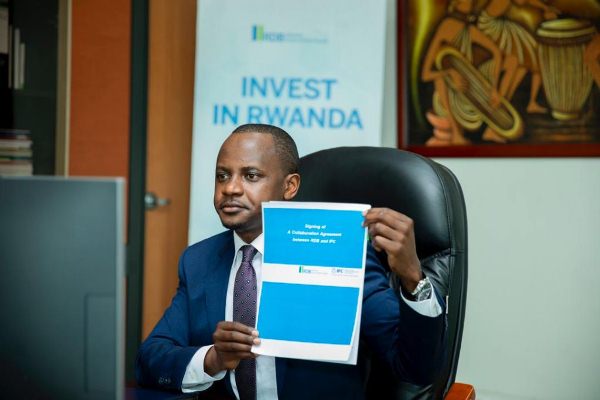
IFC and the Rwanda Development Board today signed a collaboration agreement to develop vaccine manufacturing capacity in Rwanda and contribute to expanding vaccine production in Africa.
As part of the collaboration, IFC will support Rwanda to conduct diagnostic and feasibility studies to ensure the right technical and policy frameworks needed to establish a world-class vaccine manufacturing supply chain in Rwanda are in place to produce vaccines for use in Rwanda and to export across Africa.
The partnership will focus on supporting Rwanda’s recently announced association with BioNTech, a leading biotechnology company, and the kENUP Foundation to explore establishing end-to-end manufacturing capability for mRNA vaccines. Other potential vaccine and pharmaceutical production facilities, including a fill-and-finish facility, are expected to be co-located with BioNTech in the Kigali Special Economic Zone.
Africa depends on other countries for 99 percent of its vaccine supply. The African Union and the Africa Centers for Disease Control and Prevention are aiming to have 60 percent of Africa’s routine vaccines produced locally by 2040. Africa CDC has identified Rwanda, Senegal, and South Africa as potential regional vaccine manufacturing hubs in Africa.
“Rwanda aims to produce high-quality vaccines for the African market. A production facility like the one envisaged in this collaboration agreement advances this objective. We are pleased to have IFC as a strategic partner,” said Zephanie Niyonkuru, Deputy CEO of the Rwanda Development Board (RDB).
“A resilient Africa needs to develop and maintain its own reliable vaccine supply and health industry. This partnership with the Rwanda Development Board is a vital step toward helping Africa build vaccine manufacturing capacity to respond to COVID-19 and future pandemics,” said Samuel Dzotefe, IFC’s Acting Regional Industry Director for Manufacturing, Agribusiness and Services in the Middle East and Africa.
The World Bank Group has been scaling up support to countries to produce, acquire and deliver vaccines, particularly in Africa. As of July 29, 2021, the World Bank approved operations to support vaccine rollout in 54 countries globally, amounting to $4.6 billion to help countries purchase and distribute vaccines and to address readiness issues. To support this work, IFC is working with governments and the private sector to support pharmaceutical and related vaccine manufacturing projects.
IFC- member of the World Bank Group—is the largest global development institution focused on the private sector in emerging markets. We work in more than 100 countries, using our capital, expertise, and influence to create markets and opportunities in developing countries. In fiscal year 2021, IFC committed a record $31.5 billion to private companies and financial institutions in developing countries, leveraging the power of the private sector to end extreme poverty and boost shared prosperity as economies grapple with the impacts of the COVID-19 pandemic.
The Rwanda Development Board (RDB) is a government agency in Rwanda with a vision to transform Rwanda into a dynamic global hub for business, investment, and innovation. Its mission is to fast-track economic development in Rwanda by enabling private sector growth. (End)
